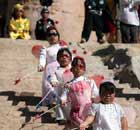-
-
China Daily E-paper
Chen Weihua
This rollercoaster ride has to stop
By Chen Weihua (China Daily)
Updated: 2010-04-06 06:48
 |
Large Medium Small |
The easing of tension between China and the United States in the last few days is a fresh reminder how capricious bilateral relations are. It's similar to the fickle weather in New York a week ago when the temperature suddenly dropped 10 degrees C.
Now it's sunny and warm again. The Sino-US relations have also averted a major showdown, at least for the time being, when US Treasury Secretary Timothy Geithner announced Saturday to delay an April 15 report that could label China as a currency manipulator.
Compared with the escalating pressure on bilateral ties in the past few months, the goodwill shown on both sides in the past week has been unexpected and encouraging.
President Hu Jintao and US President Barack Obama both expressed willingness for more cooperation in a chat over the phone last week. Obama also stressed the importance of the relations when meeting new Chinese ambassador Zhang Yesui. Deputy Secretary of State James Steinberg reiterated the US stance of "one China".
There is still quite some noise on Capitol Hill and in the US media about currency. While it is a normal part of the US political landscape, the volume has gotten a little muted recently.
On the Chinese side, several senior Chinese officials visited Washington in recent weeks hoping to mend ties.
Chinese officials were quoted by Susan Rice, the US representative to the United Nations, that they would be ready to sit down in New York to talk seriously on new sanctions on Iran.
Most important of all, President Hu has agreed to attend the Nuclear Security Summit in Washington early next week.
After trading rhetoric and taking hard stances for months, politicians in both countries finally have cooled off a bit. Both seem to understand that a hardline approach will get nothing done and will make matters worse.
Confrontation, such as a trade war, would be too destructive to both countries and the whole world. That is also why former Assistant US Trade Representative Timothy Stratford, who has 25 years of experience dealing with China, told China Daily on Friday that a trade war is unlikely.
That of course is not something that sensational journalists like to believe. The hype at the beginning of the year about how China and the US are heading toward a major collision course have worried many who care about the relationship.
That hype now seems like a prediction made by some prize-winning journalists and scholars 13 years ago after the death of Deng Xiaoping. The scenario that China will break apart into six or seven countries after Deng has never happened and is unlikely to happen in the foreseeable future.
That said, thorny issues between China and the US still exist and will remain. A proper approach to bilateral ties is essential to solve these problems.
Solutions can only be found through talks, rather than trading endless hostile rhetoric and resorting to extreme measures, such as trade protectionism and sanctions.
Government leaders must remain coolheaded since domestic political will could easily force them to make decisions and take actions that are popular among interest groups but counterproductive to fixing the issues.
But if the current goodwill gesture displayed by the US is simply a makeshift measure to get President Hu onboard the Nuclear Security Summit and a new UN resolution on Iran, then the Sino-US relations are likely to remain like fickle weather.
E-mail: [email protected]









